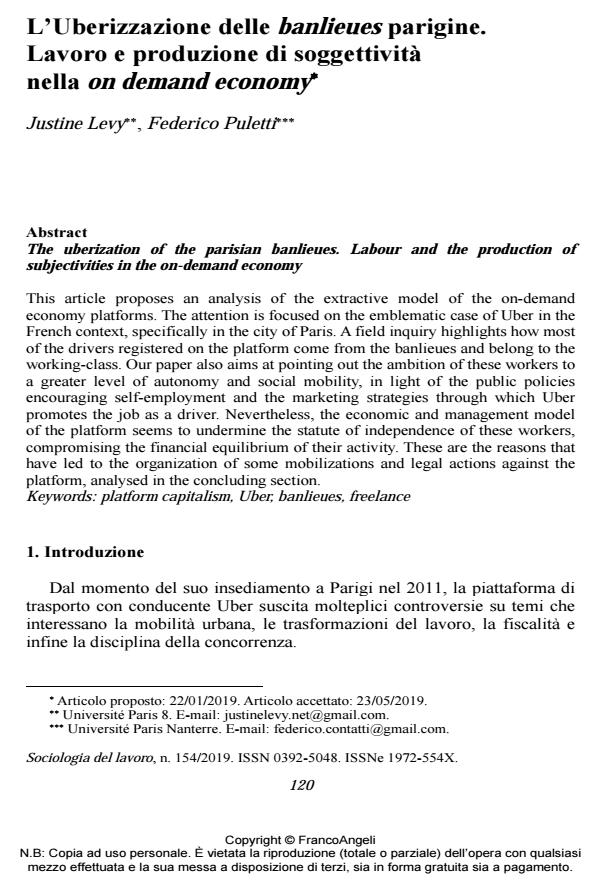The uberization of the parisian banlieues. Labour and the production of subjectivities in the on-demand economy
Journal title SOCIOLOGIA DEL LAVORO
Author/s Justine Levy, Federico Puletti
Publishing Year 2019 Issue 2019/154
Language Italian Pages 21 P. 120-140 File size 315 KB
DOI 10.3280/SL2019-154007
DOI is like a bar code for intellectual property: to have more infomation
click here
Below, you can see the article first page
If you want to buy this article in PDF format, you can do it, following the instructions to buy download credits

FrancoAngeli is member of Publishers International Linking Association, Inc (PILA), a not-for-profit association which run the CrossRef service enabling links to and from online scholarly content.
This article proposes an analysis of the extractive model of the on-demand economy platforms. The attention is focused on the emblematic case of Uber in the French context, specifically in the city of Paris. A field inquiry highlights how most of the drivers registered on the platform come from the banlieues and belong to the working-class. Our paper also aims at pointing out the ambition of these workers to a greater level of autonomy and social mobility, in light of the public policies encouraging self-employment and the marketing strategies through which Uber promotes the job as a driver. Nevertheless, the economic and management model of the platform seems to undermine the statute of independence of these workers, compromising the financial equilibrium of their activity. These are the reasons that have led to the organization of some mobilizations and legal actions against the platform, analysed in the concluding section.
L’articolo propone un’analisi del modello estrattivo delle piattaforme dell’economia on demand e concentra la sua attenzione sul caso paradigmatico di Uber nel contesto francese. Sulla base di un’inchiesta svolta a Parigi fra gli autisti iscritti alla piattaforma, il contributo ne evidenzia l’appartenenza maggioritaria alle classi popolari delle banlieues. In un secondo momento analizza l’aspirazione di questi lavoratori a un livello maggiore di autonomia e di mobilità sociale alla luce delle politiche pubbliche d’incitazione al lavoro autonomo e al marketing attraverso il quale Uber promuove il lavoro come autista. Il modello economico e di management della piattaforma sembra tuttavia pregiudicare lo statuto di indipendenti di questi lavoratori e può compromettere l’equilibrio finanziario della loro attività. Sono queste le ragioni che hanno portato all’organizzazione di alcune mobilitazioni e di azioni legali contro la piattaforma, che vengono prese in esame nella parte conclusiva.
Keywords: Platform capitalism, Uber, banlieues, freelance
- La classe operaia va nel cyberspazio. Il capitalismo di piattaforma oltre i miti della digitalizzazione Marco Marrone, Gianmarco Peterlongo, Giorgio Pirina, in ECONOMIA E SOCIETÀ REGIONALE 1/2021 pp.127
DOI: 10.3280/ES2021-001011
Justine Levy, Federico Puletti, L’Uberizzazione delle banlieues parigine. Lavoro e produzione di soggettività nella on demand economy in "SOCIOLOGIA DEL LAVORO " 154/2019, pp 120-140, DOI: 10.3280/SL2019-154007